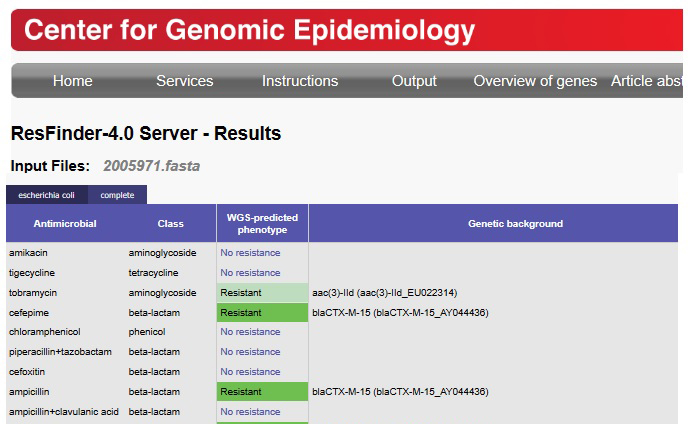- The Laboratory
- Organization
- Departments
- Jobs
- Analysis book
- Contact
- News
- Publications
- Download



Results now published confirm the reliability of bioinformatics methods based on WGS
The Laboratoire national de santé (LNS) has once again contributed to an international scientific journal as a co-author. The study, now published in the prestigious Journal of Antimicrobial Chemotherapy, focused on antibiotic susceptibility testing, and more specifically on the development of an online bioinformatic tool to define the antibiotic resistance of a bacterial strain based on the complete sequence data of its genome (Whole Genome Sequencing – WGS).
The paper involved laboratories, universities and other research players from several European countries and the USA. The LNS’s contribution was led by Catherine Ragimbeau PhD and Joël Mossong PhD from the Epidemiology and Microbial Genomics Unit. The microbiologists worked in collaboration with the Laboratoire de Médecine Vétérinaire de l’Etat (LMVE), also based in Dudelange.
95 percent concordance with conventional laboratory tests
The aim of the collaboration was to demonstrate the reliability of WGS compared to traditional laboratory methods, as Catherine Ragimbeau explains: “WGS allows us to obtain antibiotic susceptibility testing (AST) in a simple way, namely by computerising the genomic data of the strain. The programme can identify not only genes that cause resistance to antibiotics but also genetic mutations that confer that resistance. Currently, in vitro tests are based on examining the strain cultivated in the presence of the antimicrobial molecules to be tested, but this conceptually simple method suffers from some limitations that hinder the reproducibility of results. In addition, phenotypic AST is limited by the fact that current agreements between different organizations on panels of antimicrobial agents to test and on interpretative criteria are not complete.”
In order to obtain a representative result, a large panel of strains of both human and animal origin was validated using WGS – with significant results, Catherine Ragimbeau points out: “The agreement between the results from WGS and those from laboratory tests is 95%. Moreover, the few differences observed are mostly due to a problem of sequence quality. The bottom line is that WGS-based antimicrobial sensitivity tests are in most cases as reliable as conventional methods.”
Diverse research capabilities, based in Luxembourg
This is the second study with LNS involvement to be published in an international journal within a very short period of time, as Prof Dr Friedrich Mühlschlegel, Director of the LNS, explains: “In August, a study on the geographical and temporal distribution of SARS-CoV-2 clades in Europe was published in Eurosurveillance, the specialist publication for infectious diseases. This also documented our contributions towards tackling the major medical issue of 2020, COVID-19. With this paper on antibiotic susceptibility, in turn, we are demonstrating our expertise concerning long-term issues. Both underline the role of the LNS as the first institution in Luxembourg to go to for such international projects.”
Link to the article: https://academic.oup.com/jac/advance-article/doi/10.1093/jac/dkaa345/5890997